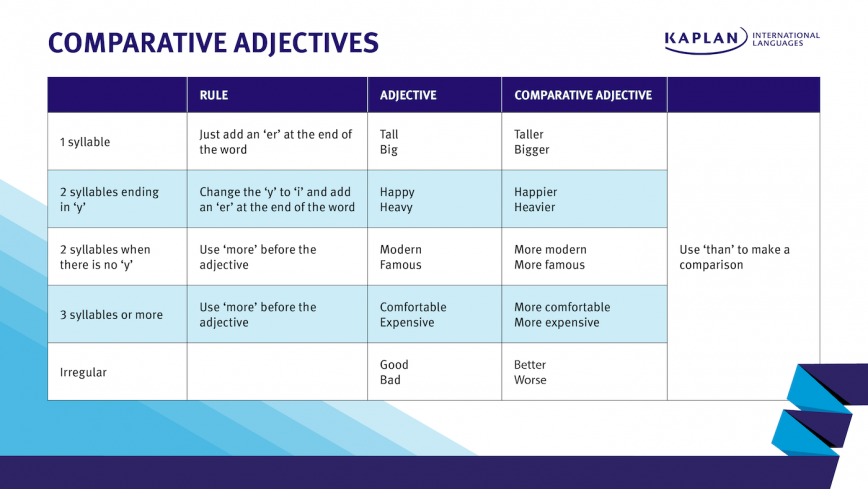Everything You Need to Know About Comparative Adjectives

In English, adjectives are used to describe things. We use comparative adjectives to compare and contrast things that we want to describe. There is a system for creating comparative adjectives. Using this system will help you write and speak more clearly, and will make you a better English speaker! If you're still learning English, take the time to study this lesson, because it will definitely come in handy!
Comparative Adjectives is a great lesson for two reasons. Number one: it's a topic a lot of students make mistakes with, but it's very easy to fix - the rules are simple if you just stick to them. Number two: it'll make you sound much more like a native speaker if you can use the rules effectively.
Matt, teacher from San Diego
One Syllable Comparative Adjectives
Add -er to end of an adjective:
tall/taller
smart/smarter
If the word ends in -e, just add an -r:
late/later
large/larger
If the word is one-syllable, ends in a single consonant and has a single vowel before it, double the last consonant and add -er:
big/bigger
hot/hotter
thin/thinner
See our teacher Matt from San Diego explain how it all works:
Take a look at how our teacher Matt, explains comparative adjectives:
Two, Three or More Syllable Comparative Adjectives
For most two-syllable adjectives, add "more" before the adjective to form the comparative:
careful/more careful
prepared/more prepared
If the word ends in -y, remove it and add -ier:
angry/angrier
shiny/shinier
If the word ends in -e, add -r:
gentle/gentler
simple/simpler
If the word ends -ow; add -er:
narrow/narrower
Exceptions
Of course, with any rule in English, there are exceptions.
| Irregular Adjective | Comparative Form |
| good | better |
| bad | worse |
| far | farther |
| little | less |
| many | more |
There are some adjectives that can be used both with 'more' and with 'er'
| Two-Syllable Adjective | Comparative Form 'er' | Comparative Form 'more +' |
| clever | cleverer | more clever |
| gentle | gentler | more gentle |
| friendly | friendlier | more friendly |
| quiet | quieter | more quiet |
| simple | simpler | more simple |
Once you have mastered comparative adjectives, you'll become more confident when comparing things in English and will get one step closer to sounding like a native speaker!
 617 275-5955
617 275-5955



